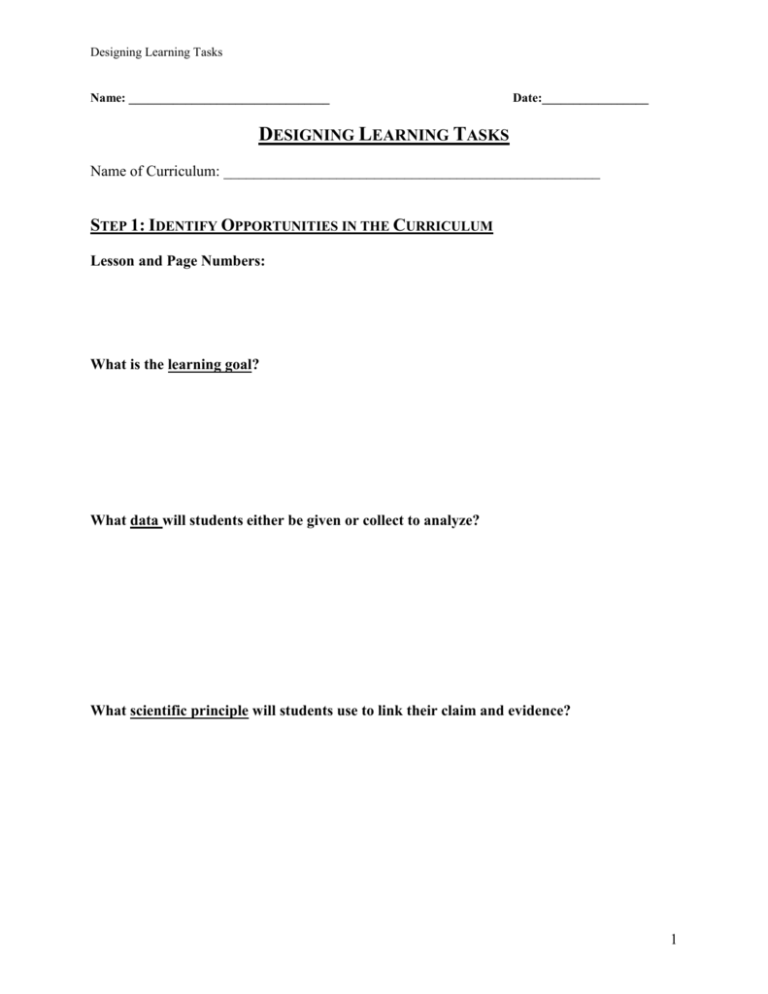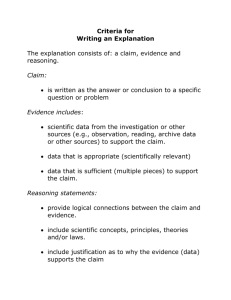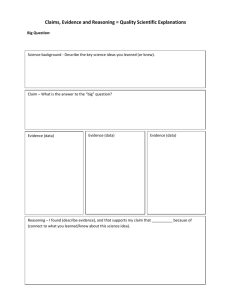Learning Task Handout - Supporting Students in Science Thinking
advertisement

Designing Learning Tasks Name: ________________________________ Date:_________________ DESIGNING LEARNING TASKS Name of Curriculum: __________________________________________________ STEP 1: IDENTIFY OPPORTUNITIES IN THE CURRICULUM Lesson and Page Numbers: What is the learning goal? What data will students either be given or collect to analyze? What scientific principle will students use to link their claim and evidence? 1 Designing Learning Tasks STEP 2: DESIGN COMPLEXITY OF THE LEARNING TASK For each of the following characteristics consider how simple or complex you want the learning task to be depending on the needs of your students. What question will you ask students? What specific data will you either provide students or have students collect? How much data will you have students analyze? What variation of the framework do you want students to include in their response? For example – complexity of the evidence, complexity of reasoning and inclusion of rebuttal 2 Designing Learning Tasks STEP 3: CREATE CLASSROOM SUPPORTS Do you want to include any type of visual representation in your classroom? If yes, describe or sketch the representation. Do you want to provide students with curricular scaffolds? If yes, draft the scaffolds below. Consider – content specific, generic or combination AND level of detail to include 3 Designing Learning Tasks Table 2.3: Variations of the Instructional Framework for Scientific Explanation Level of Framework Description of Framework for Students Complexity Sequence Variation #1 Claim Simple 1. Claim a statement that answers the question 2. Evidence Evidence 3. Reasoning scientific data that supports the claim Reasoning a justification for why the evidence supports the claim using scientific principles Variation #2 Claim 1. Claim a statement that answers the question 2. Evidence Evidence Appropriate scientific data that supports the claim Sufficient data needs to be appropriate 3. Reasoning data needs to be sufficient Reasoning a justification for why the evidence supports the claim using scientific principles Variation #3 Claim 1. Claim a statement that answers the question 2. Evidence Evidence Appropriate scientific data that supports the claim Sufficient data needs to be appropriate 3. Reasoning data needs to be sufficient Multiple Reasoning components a justification for why the evidence supports the claim using scientific principles each piece of evidence may have a different justification for why it supports the claim Variation #4 Claim 1. Claim a statement that answers the question 2. Evidence Evidence Appropriate scientific data that supports the claim Sufficient data needs to be appropriate 3. Reasoning data needs to be sufficient Multiple Reasoning components a justification for why the evidence supports the 4. Rebuttal claim using scientific principles each piece of evidence may have a different Complex justification for why it supports the claim Rebuttal describes alternative explanations, and provides counter evidence and reasoning for why the alternative explanation is not appropriate. 4 Designing Learning Tasks 5








